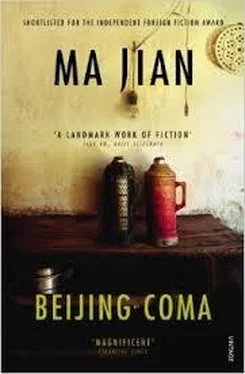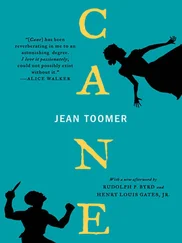Behind them, in the centre of the Square, rose the granite obelisk of the Monument to the People’s Heroes. When I was a kid, my class used to be taken to the Monument every year on Children’s Day to lay wreaths to the revolutionary martyrs. Beyond the Monument was the Great Hall of the People, the home of the National People’s Congress. The tawny concrete building sat on the eastern side of the Square like a huge shipping container. I looked north to the red walls of Tiananmen Gate, the entrance to the Forbidden City where China’s emperors used to live. From a distance, the police vans parked beneath it looked like tiny beetles. In 1949, Mao stood on Tiananmen Gate and declared the founding of the People’s Republic. His giant portrait now gazed down from it, and his embalmed corpse lay in a memorial hall to the south. The Square was Mao’s mausoleum. I couldn’t believe that we’d dared venture onto this sacred site to express criticism of the Party he created.
‘I’d hoped we’d get a bigger crowd than this,’ said Wang Fei, walking over to me. ‘Did you bring the banner? I knew Mou Sen wouldn’t have the balls to come!’ He was wearing his usual thin blue windcheater. He looked as frozen as an ice lolly.
‘I bought the cloth, and I’ve cut out the characters, but I haven’t had time to sew them on yet,’ I said, pulling the red cloth from my bag.
‘Don’t do it in front of the police. They’ll confiscate it. It’s mostly arts students here. Only about twenty science students have turned up. Chen Di took his binoculars out a minute ago and saw someone filming us from the Great Hall of the People. He panicked and ran back to the campus.’ As Wang Fei spoke, the steam rising from his mouth condensed onto the lenses of his glasses.
‘I should have filched those binoculars from him ages ago, and given him some eggs for them,’ I said. ‘Let’s go and stand behind those trees. The police won’t see us there.’ I was wearing a down jacket. My chest was warm but my face was very cold.
As we walked over to the trees, I spotted Wang Fei’s girlfriend, the zoology student. She and some other girls were standing snuggled up to each other for warmth, their arms tightly linked. They looked as though they’d been frozen together. Wang Fei said to me, ‘I’ve made a horizontal banner. You’ll be amazed when you see it.’
‘I doubt there are even a thousand students here,’ I said. ‘Apparently over two thousand people turned up for the Qinghua University demonstration last week.’
‘The numbers aren’t important. All that matters is that the demo gets reported in the foreign press. Shu Tong said that he’s contacted all the foreign correspondents and asked them to come.’
The organiser of the demonstration, an earnest sociology researcher called Hai Feng, walked up with a group of his classmates from the Social Science Department. ‘We’ve made a flag, but we don’t have a pole,’ he said. Drops of condensed breath dotted the portion of his scarf that was closest to his mouth. I’d heard that the previous year, he and a few of his friends had taken dusters and shoe cream to Tiananmen Square and earned some pocket money by polishing the shoes of National People’s Congress delegates before they entered the Great Hall of the People. It had made him the laughing stock of the campus.
‘It’s so annoying,’ the tall law student Zhuzi said, joining our small group. ‘I bought loads of poles with me and hid them in the underpass over there. But a plain-clothes policeman took them away. How many science students have turned up?’ We called him ‘Zhuzi’, which means bamboo pole, because of his exceptional height. He was the star of the university’s basketball team.
‘About a hundred,’ Wang Fei exaggerated, lighting a cigarette. ‘But it looks like students from other universities have come as well.’
I sat down under a tree and quickly sewed the characters onto the red banner. Then I got up and surveyed the scene. ‘Look at those two plain-clothes policemen standing behind the foreigner over there,’ I said. ‘They’re about to snatch his camera. None of us has got a camera. Who will take the photos now?’
Uniformed and plain-clothes officers guarded the perimeter of the Square, pushing away any pedestrian or cyclist who tried to enter. Even the Chinese tourists from the provinces, dressed in their best clothes, were being pushed back as they attempted to get onto the Square to take New Year’s Day photographs in front of Mao’s portrait.
Shu Tong, Old Fu and Liu Gang came over.
‘Three foreign journalists have arrived, so all is going to plan,’ Shu Tong said authoritatively. ‘If they don’t manage to get photos, at least they can write articles. The BBC World Service reported that the Square has been cordoned off. Lots of students from other universities heard the news, and decided to come along.’ Then he turned to a student from the Chinese Department and said, ‘How come Yang Tao isn’t here yet?’
Yang Tao was a co-founder of the Democracy Salon. Wang Fei told me that he was a talented strategist, and was always coming up with cunning plans.
‘He got a telegram saying his father was critically ill, so he rushed back to Chongqing,’ a student in a heavy army coat answered, stamping his cold feet.
‘Damn!’ Hai Feng said. ‘He fell into their trap. He of all people! I got a similar telegram, but luckily I had the sense to make a long-distance call to my dad. It turned out he wasn’t ill at all. The police sent the telegrams to all the ringleaders to trick us into leaving Beijing.’
‘There’s no sign of Ke Xi,’ Shu Tong said, walking up the steps of the Museum of Chinese History to assess the size of our crowd. ‘Probably chickened out at the last minute.’
‘The arts students have definitely outnumbered us,’ I said. ‘Hey, look over there! The police are filming us from the van. We’d better get down from here.’
The untrampled snow on the empty Square was brilliantly white. A few police officers were now standing in the centre of it, next to a truck emblazoned with the words TRAFFIC SAFETY WEEK. They looked minuscule. The four loudspeakers on the truck’s roof blared out the message: ‘The municipal authorities are carrying out a large-scale traffic survey. No work unit or individual must hinder proceedings. All group activities in the Square are strictly forbidden…’
‘If Yang Tao’s been tricked into leaving Beijing, I doubt many members of his Democracy Salon have made it here,’ Old Fu said.
We went to join the crowd of civilians that had gathered outside the police cordon. They were all wearing heavy winter coats. Some were casual passers-by, others had heard rumours about the demonstration and had come to witness the spectacle. A peasant in a padded Mao suit holding a bag of peanuts squeezed over to us and said, ‘I’ve heard there’s going to be a demonstration against corruption and official profiteering. I’d like to take part. In the countryside, our lives have been ruined by corrupt officials. I want to tell Beijing citizens about all the injustices we have to put up with.’ I asked him where he was from. He said Shandong Province. I told that him that we were compatriots, as my father was from Shandong too. I advised him not to join the protest. Two workers in blue caps standing beside him said, ‘You’re here now, mate, so you might as well join in. If you speak out on behalf of the people, we’ll support you. You can’t just stand here and watch.’
The two workers asked me what university I was from, and who was coordinating the demonstration. They said they wanted to get involved. I told them I was from Beijing University.
‘Give me a leaflet,’ they said. ‘I bet your bag’s full of them. Who’s in charge of your propaganda?’
Читать дальше












